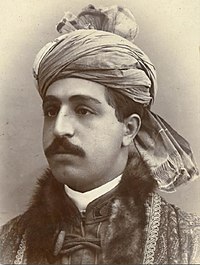
Back محمد أيوب خان (أمير أفغانستان) Arabic محمد ايوب خان (الامير من افغانستان) ARZ محمد ایوب خان AZB মুহাম্মদ আইয়ুব খান (আফগানিস্তানের আমির) Bengali/Bangla Ayyub Khan Catalan Mohammed Ayub Khan (Afghanistan) German Αγιούμπ Χαν (Εμίρης του Αφγανιστάν) Greek محمد ایوب خان Persian Muhammad Aijub Khan Finnish איוב ח'אן, אמיר אפגניסטן HE
| Mohammad Ayub Khan غازي محمد ايوب خان | |||||
|---|---|---|---|---|---|
| Emir of Afghanistan | |||||
 Ghazi Mohammad Ayub Khan | |||||
| Emir of Afghanistan | |||||
| Reign | 12 October 1879 – 31 May 1880 | ||||
| Predecessor | Mohammad Yaqub Khan | ||||
| Successor | Abdur Rahman Khan | ||||
| Born | 1857 Kabul, Emirate of Afghanistan | ||||
| Died | 7 April 1914 (aged 56–57) Lahore, Punjab, British India[1] | ||||
| Burial | 1914 Peshawar, British India | ||||
| Issue | Sardar Abdul Qadir Khan El-Effendi
Sardar Akram Khan Sardar Abdul Samad Khan | ||||
| |||||
| Dynasty | Barakzai dynasty | ||||
| Father | Sher Ali Khan | ||||
| Mother | Momand | ||||
Ghazi Mohammad Ayub Khan (Pashto: غازي محمد ايوب خان ; Dari: غازی محمد ایوب خان) (1857 – 7 April 1914) also known as The Victor of Maiwand or The Afghan Prince Charlie was, for a while, the governor of Herat Province in the Emirate of Afghanistan. He was Emir of Afghanistan from 12 October, 1879 to 31 May, 1880.[2][3] He also led the Afghan troops during the Second Anglo-Afghan War and defeated the British Indian Army at the Battle of Maiwand. Following his defeat at the Battle of Kandahar, Ayub Khan was deposed and exiled to British India. However, Ayub Khan fled to Persia (now Iran). After negotiations in 1888 with Sir Mortimer Durand, the ambassador at Tehran, Ayub Khan became a pensioner of the British Raj and traveled to British India in 1888, where he lived until his death in 1914 in Lahore, Punjab.[1] He was buried in Peshawar and had eleven wives, fifteen sons, and ten daughters.[4] Two of his grandsons, Sardar Hissam Mahmud el-Effendi and Sardar Muhammad Ismail Khan, served as brigadiers in the Pakistan Army.[5][6][7][8]
In Afghanistan, he is remembered as the "National Hero of Afghanistan."[4]
- ^ a b Dupree, Louis (2014). Afghanistan. Princeton University Press. p. 418. ISBN 978-1400858910.
- ^ Hamid. "Afghanistan Monarchs". afghanistantourism.net. Archived from the original on 2012-03-27. Retrieved 2011-07-14.
- ^ Wahid Momand. "Leaders". Afghanland.com. Archived from the original on 2011-07-09. Retrieved 2011-07-14.
- ^ a b various. "Cities". The Columbia Encyclopedia, 6th ed.
- ^ Arwin Rahi. The legacy of Sardar Mohammad Ayub Khan – The Victor of Maiwand. Express Tribune. 15 July 2021. Archived version
- ^ Cite error: The named reference
grandson1was invoked but never defined (see the help page). - ^ Cite error: The named reference
grandson4was invoked but never defined (see the help page). - ^ Cite error: The named reference
grandson3was invoked but never defined (see the help page).
© MMXXIII Rich X Search. We shall prevail. All rights reserved. Rich X Search